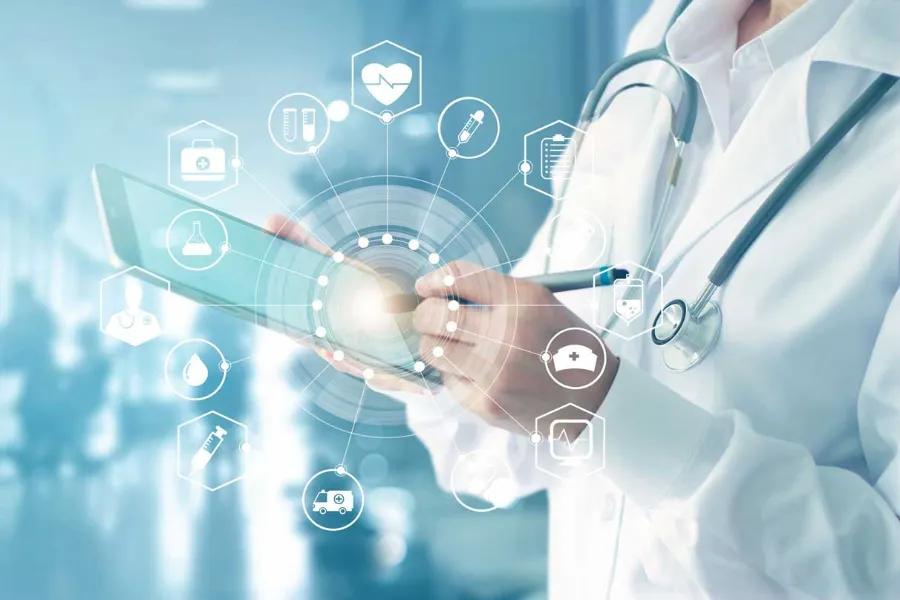Key features:
- Regular medical auditing improves patient safety by uncovering hidden risks and addressing potential hazards.
- Audits ensure compliance with regulations, guidelines, and standards, reducing legal and financial risks.
- Medical auditing enhances the quality of care by identifying areas for improvement and implementing necessary changes.
- Audits help prevent fraud by detecting discrepancies in coding, billing, and documentation.
- Optimized resource utilization through audits leads to cost-effective care delivery and improved operational efficiency.
- Medical auditing strengthens organizational performance, reputation, and patient satisfaction.
- Overcoming resistance to change and increasing awareness are key challenges in implementing regular audits.
- Technology streamlines auditing processes, improves efficiency, and offers innovative tools for medical auditing.
Medical auditing is a process that evaluates and assesses various aspects of healthcare organizations to ensure compliance, accuracy, and quality of care. It plays a crucial role in uncovering hidden risks and ensuring quality healthcare delivery.
Medical auditing is the systematic evaluation and examination of healthcare organizations’ practices, processes, and documentation to assess their adherence to regulations, guidelines, and industry standards. Medical auditing services involve reviewing medical coding, billing, clinical documentation, and resource utilization to ensure accuracy, compliance, and optimal patient care.
Importance of regular medical auditing

Medical auditing services are essential for several reasons. It helps identify and rectify errors, discrepancies, and potential risks that can compromise patient safety and quality of care.
Ensuring Regulatory Compliance
Healthcare organizations are subject to numerous regulations, guidelines, and standards. Medical auditing helps ensure that these regulations are followed and that the organization remains in compliance.
By conducting regular audits, healthcare organizations can identify any non-compliance issues and take corrective actions to avoid penalties, legal consequences, and reputational damage.
Enhancing Patient Safety
Patient safety is of paramount importance in healthcare. Medical auditing helps uncover hidden risks and potential hazards that can compromise patient safety.
By identifying areas of improvement, audits enable healthcare organizations to implement necessary changes and safeguards to enhance patient safety protocols. This ultimately leads to better patient outcomes and reduces the risk of medical errors.
Improving Quality of Care
Regular medical auditing allows healthcare organizations to evaluate and assess the quality of care being provided. Audits can identify areas where care delivery falls short or where improvements can be made. By addressing these areas, healthcare organizations can enhance the overall quality of care, resulting in improved patient experiences and better health outcomes.
Identifying and Preventing Fraud
Medical auditing is instrumental in identifying fraudulent practices within healthcare organizations. Audits can help detect discrepancies in coding, billing, and documentation that may indicate potential fraud.
By conducting thorough audits, organizations can implement fraud prevention measures, protecting both patients and the integrity of the healthcare system.
Optimizing Resource Utilization
Efficient resource utilization is crucial for healthcare organizations to provide cost-effective care. Medical auditing services help assess the utilization of resources such as equipment, facilities, and personnel. By identifying areas of inefficiency or waste, audits enable organizations to optimize resource allocation, reduce unnecessary expenses, and improve overall operational efficiency.
Strengthening Organizational Performance
Regular medical auditing contributes to the overall performance of healthcare organizations. By identifying areas for improvement and implementing necessary changes, audits enhance operational efficiency, effectiveness, and financial stability. This, in turn, strengthens the organization’s reputation, enhances patient satisfaction, and fosters trust among stakeholders.
Identifying Hidden Risks through Medical Auditing

Ensuring accuracy and compliance in medical coding and billing:
Incorrect coding and billing practices pose significant risks in healthcare settings. Mistakes can lead to financial losses and potential fraud. Medical auditing services play a crucial role in identifying coding errors and potential fraud by reviewing coding practices, ensuring accuracy, and detecting discrepancies in billing documentation.
Evaluating clinical documentation and quality of care:
Comprehensive and accurate medical records are vital for effective communication and the delivery of quality care. Medical auditing services highlight the importance of maintaining comprehensive and accurate medical records. Through audits, documentation practices are assessed, identifying areas for improvement to enhance the quality and accuracy of patient information.
Monitoring healthcare resource utilization:
Appropriate utilization of healthcare resources is essential for optimal care delivery. Medical auditing services emphasize the importance of efficient resource allocation.
Utilization audits help identify inefficiencies and potential risks by evaluating the utilization patterns of equipment, facilities, and personnel. By identifying areas where resources are not utilized optimally, organizations can make informed decisions to improve efficiency and cost-effectiveness.
Benefits of Regular Medical Auditing

Enhanced patient safety and quality of care
Regular medical auditing services provided by medical billing companies contribute to improved patient safety by uncovering hidden risks. Through systematic evaluation, audits identify potential errors and hazards that can compromise patient well-being. By addressing these risks, healthcare organizations can enhance the overall quality of care and ensure patient safety.
Furthermore, there is a strong correlation between auditing and better healthcare outcomes, as audits help identify areas for improvement, leading to more effective and efficient care delivery.
Mitigating legal and financial risks
Medical auditing services play a vital role in mitigating legal and financial risks for healthcare organizations. Auditing helps identify compliance issues, ensuring adherence to regulations and standards.
By identifying and rectifying non-compliant practices, audits reduce the potential for legal liabilities, penalties, and lawsuits. Additionally, regular audits aid in identifying and rectifying potential revenue leakages, ensuring optimal financial performance for healthcare organizations.
Strengthening organizational performance and reputation
Auditing services contribute to strengthening organizational performance and reputation in several ways. First, audits improve operational efficiency and effectiveness by identifying areas of inefficiency or waste. By streamlining processes and optimizing resource utilization, audits enhance the overall performance of healthcare organizations.
Second, a positive reputation is crucial in healthcare. Regular auditing demonstrates a commitment to quality, safety, and compliance, which fosters patient satisfaction and trust. A reputable healthcare organization is more likely to attract and retain patients, leading to improved overall performance and success.
Challenges and Solutions in Medical Auditing

Addressing resistance to change and lack of awareness
Common barriers to implementing regular medical audits
Resistance to change and lack of awareness are common challenges in adopting regular medical audits. Healthcare professionals and organizations may be hesitant to embrace new auditing practices due to concerns about disruption or increased workload.
Additionally, there may be a lack of awareness about the benefits of auditing and its impact on patient safety and organizational performance.
Strategies to overcome resistance and increase awareness
To address these challenges, it is essential to provide comprehensive education and training to stakeholders. Highlighting the positive impact of auditing on patient safety, financial stability, and organizational reputation can help minimize resistance.
Engaging key stakeholders and involving them in the audit process can create a sense of ownership and encourage participation. Additionally, actively promoting the benefits of regular audits through various channels such as workshops, seminars, and newsletters can increase awareness and foster a culture of continuous improvement.
Utilizing technology for efficient and effective auditing:

Streamlining auditing processes through technology:
Technology plays a critical role in streamlining auditing processes, making them more efficient and effective. Electronic health record (EHR) systems, for example, can centralize patient information, making it easier to access and review during audits.
Automation tools can facilitate data collection, analysis, and reporting, reducing manual errors and saving time. Technology also enables real-time monitoring and tracking of audit progress, improving overall efficiency.
Innovative tools and software for medical auditing:
There are innovative tools and software specifically designed for medical auditing purposes. These tools offer features such as coding validation, documentation analysis, and compliance checks. They help auditors identify coding errors, compliance gaps, and documentation deficiencies more accurately and efficiently. These technologies enable auditors to focus on high-risk areas and prioritize their efforts, leading to more effective audits and better outcomes.
Conclusion
In the ever-evolving healthcare landscape, medical auditing is a fundamental practice that supports continuous improvement and optimal care delivery. Healthcare organizations should prioritize and invest in regular medical auditing services to ensure regulatory compliance, enhance patient safety, improve the quality of care, prevent fraud, optimize resource utilization, and strengthen overall organizational performance.
By embracing medical auditing, healthcare organizations can provide high-quality, safe, and efficient healthcare services to their patients while maintaining compliance with regulations and industry standards.









